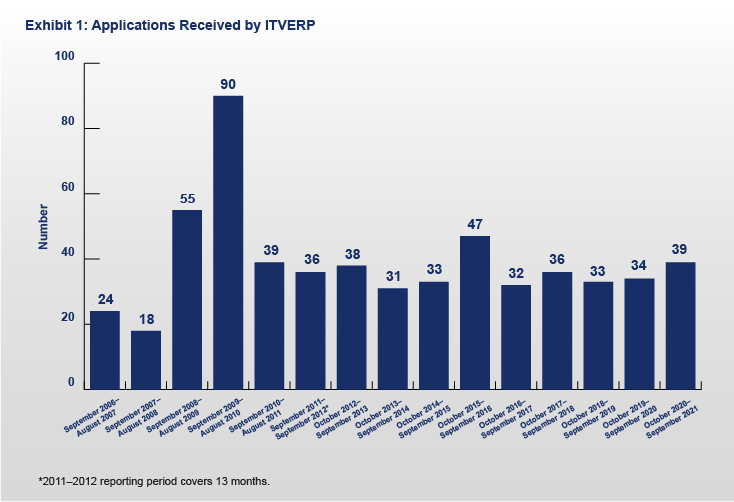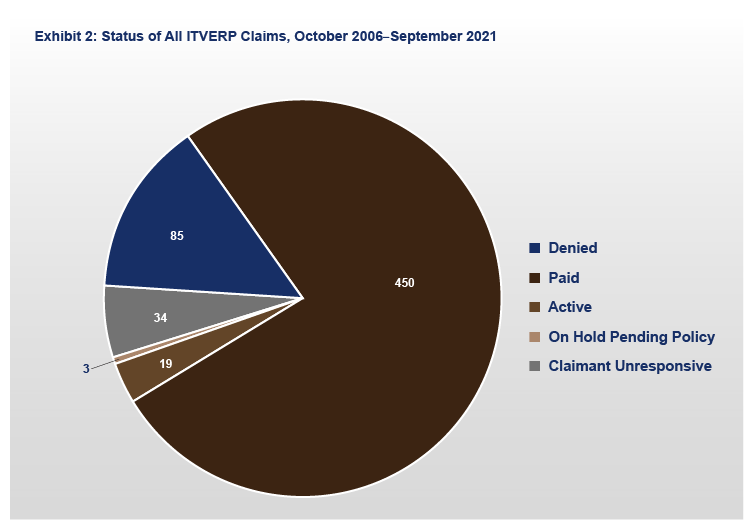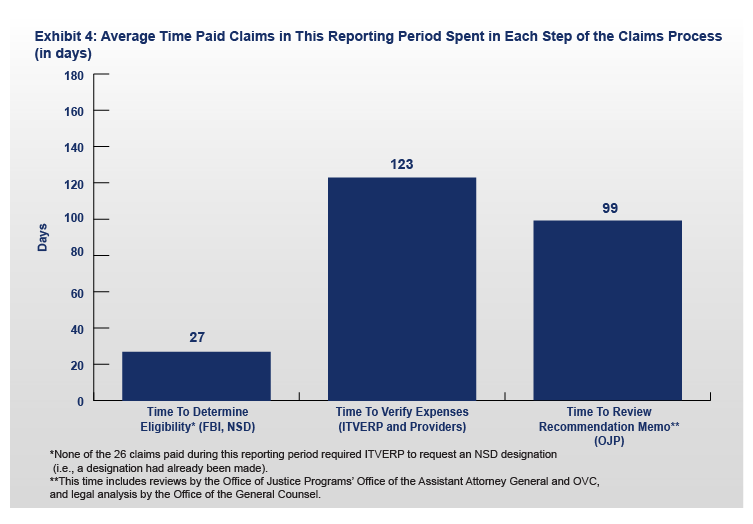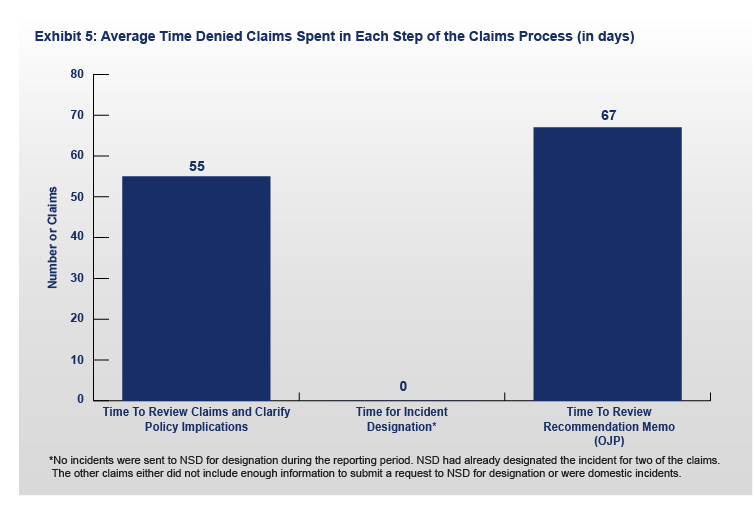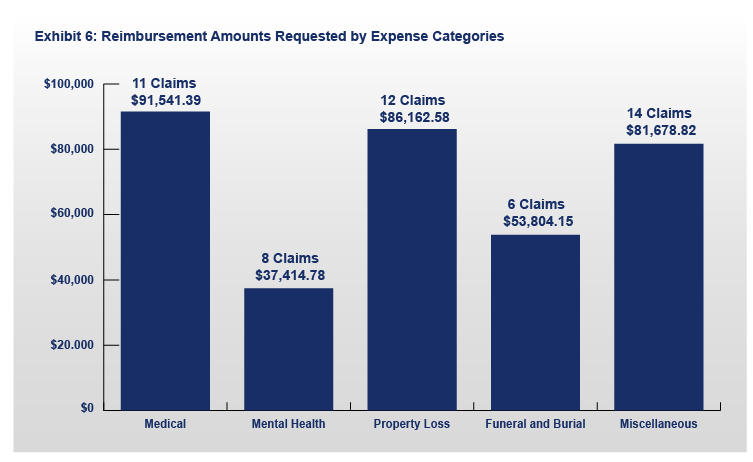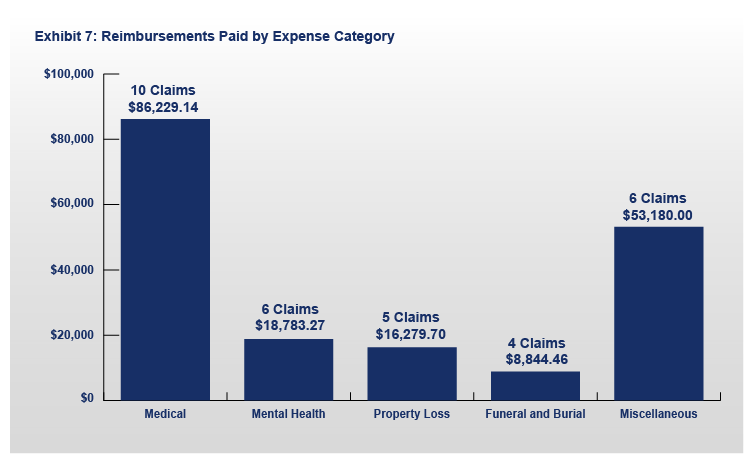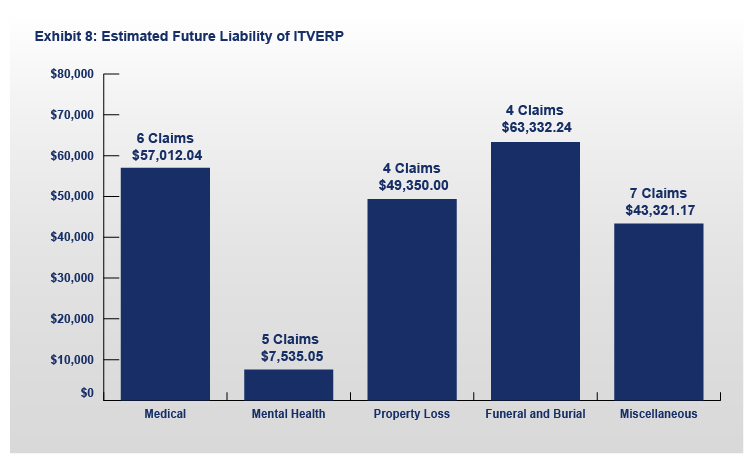ITVERP Assistance and Outreach
This report provides a summary of the International Terrorism Victim Expense Reimbursement Program (ITVERP) activities from October 1, 2020, through September 30, 2021. It covers two critical areas of ITVERP assistance—application processing and claims payment, and public awareness activities intended to reach out to potential claimants. The report concludes with a discussion of future program needs and suggested improvements.
Program Highlights
- ITVERP Data Management System Information
- Outreach Initiative to Current Victims for Ongoing Medical and Mental Health Expenses
- Increased Collaboration with Other Federal Agency Partners
Reimbursement Activities
This section highlights the activities and accomplishments related to ITVERP’s primary function of processing applications for reimbursement, including—
- the number of applications received;
- the status of claims;
- the current processing time for claims;
- details about reimbursements paid to claimants; and
- the number of appeals under the program to date.
Applications Received and Processed
During this reporting period, ITVERP received 39 new applications for reimbursement. The applications reflect terrorist incidents dating from February 7, 1991, to August 26, 2021. Exhibit 1 illustrates the number of applications received during each ITVERP reporting period since the program’s inception in 2006.
Status of Claims
As claims move through certain phases of the application process, the Office for Victims of Crime (OVC) classifies them into one of four related statuses:
- Active claims. Active claims are those in process by ITVERP staff while eligibility and expenses are verified and additional information is gathered. A claim that is pending National Security Division (NSD) designation is also considered active.
- Claimant unresponsive. Frequently, claimants initiate the application process but are not responsive when asked to provide additional information to complete their application. Claimants have 120 calendar days from the time ITVERP receives their initial application to provide the necessary information or the claim becomes inactive.
- Denied. A claim is considered denied after the OVC Director determines that no reimbursement may be paid. Such claims are also considered inactive.
- Paid. A claim is considered paid after a claimant receives reimbursement. Once a claim is paid, it is also considered inactive.
At the end of this reporting period, there were 19 active claims, of which 9 were in process. ITVERP has paid 450 claims, denied 85 claims, and designated 37 claims as claimant unresponsive (inactive) since the implementation of the program in 2006. Exhibit 2 presents the status of all ITVERP claims.
Foreign Service National Claims
During this reporting period, ITVERP did not receive any claims from Foreign Service Nationals.
Processing Time
To process claims, ITVERP requires verification of the claimant’s eligibility and confirmation that the expenses submitted have been processed in compliance with ITVERP regulations. Generally, claims denied because the victim was deemed ineligible have shorter processing times since ITVERP’s review is not contingent on a claimant completing the application or on expenses being verified; however, depending on the reason for the denial, claims may undergo victim verification and the incident designation process before being denied. For example, if victim verification requires coordination with an investigating agency other than the Federal Bureau of Investigation (FBI), it may take time to identify the agency responsible for verification. Also, for an act of terrorism, NSD must conduct its investigation to determine whether an incident qualifies as an act of terrorism for the purpose of ITVERP. Each of the elements above effects review time. Exhibit 3 shows the average length of time it took to process the 26 paid claims and 15 denied claims during this reporting period.
Exhibits 4 and 5 show the average number of days it took for paid and denied claims to move through different steps in the claims process.
Reimbursement Requests by Expense Categories
Potential claimants who incurred multiple expenses may apply for reimbursement in more than one expense category. ITVERP case managers work closely with claimants and potential claimants to assess and fully identify their needs to ensure they receive the maximum reimbursement allowable. Each category of expenses has a limit for maximum reimbursement amount.
Exhibit 6 shows the dollar amount of reimbursements requested by expense category for the 39 new applications received during this reporting period. Thirteen claimants applied for reimbursement under multiple expense categories. Two claims totaling $10,180,000.00 in property loss and $105,500.00 in medical are excluded from the calculations, as OVC found that these claims were frivolous and would have heavily skewed the data.
Reimbursements Paid by Expense Categories
During this reporting period, ITVERP paid a total of $88,623.48 in reimbursement requests. Exhibit 7 shows the dollar amount of reimbursements paid to the 26 claimants by each expense category during the reporting period. Some claimants were reimbursed in multiple expense categories.
Appeals
Under ITVERP regulations, claimants may file an appeal within 30 days of receipt of the OVC Director's determination of their claim. Since the inception of the program, ITVERP has only received three appeals, including one appeal filed during this reporting period.
Future Liability
Claims that are in process represent an estimate of ITVERP’s potential future liability. If the 19 active claims are paid in the amounts requested, ITVERP's potential future liability is $220,550.50. Exhibit 8 shows ITVERP’s estimated future liability by type of expense reimbursement category.
Program Updates
Deadline Extensions
The OVC Director, at her discretion, is authorized to extend the filing deadline for ITVERP applications based on a showing of good cause. Of the 39 new applications received during this reporting period, 3 applicants requested an extension of the 3-year filing deadline. One claim was granted an extension. The other two claims were related to domestic incidents, and therefore denied on that basis.
Supplemental Claims
Claimants who received reimbursement for their itemized claim are eligible to file a supplemental claim for their ongoing expenses related to the incident. Ten of the 39 claims received by ITVERP during the reporting period were supplemental claims; 7 of the 10 supplemental claims requested reimbursement for ongoing mental health expenses.
Promoting Public Awareness
Victims of terrorism must focus on their immediate medical, mental health, family, housing, and other needs and those of their loved ones. Many victims and their families are not aware of the resources available to them. A critical ongoing effort for ITVERP is to reach out to victims of international terrorist incidents and their families to inform them of the assistance this program offers. Outreach activities are focused on two specific groups primarily: first, victims, survivors, and families of terrorism victims who are considered potential claimants; and second, collaborating agencies and organizations that may have contact with potential claimants. This section describes ITVERP's outreach efforts during this reporting period.
Outreach to Potential Claimants
ITVERP’s outreach efforts focus on victims of international acts of terrorism and their family members who may be eligible for reimbursement under the program. OVC coordinates with the FBI’s Victim Services Division (VSD) and the U.S. Department of State (DOS) to identify potential claimants.
When terrorism incidents occur outside the United States, DOS is the first to respond, locating and identifying U.S. citizens. VSD is then able to respond, and where appropriate, identify ITVERP as a potential resource. In the aftermath of an incident, and where appropriate, VSD provides victims or their families with information about the program.
For the victims and family members who choose to apply for benefits, ITVERP case managers verify eligibility and deliver support and assistance throughout the application intake and claims verification process. Additionally, ITVERP case managers conduct outreach to existing and prior claimants to inquire as to whether they have additional expenses to submit. During this reporting period, ITVERP sent individual outreach letters to 19 potential claimants.
Outreach to Collaborating Agencies and Organizations
Another goal of OVC’s outreach efforts is to educate the victim assistance community about ITVERP, including collaborating agencies and potential partners. By reaching out to branches of the military, international nongovernmental organizations (NGOs), and individuals who may come into contact with victims of international terrorism, OVC increases awareness about ITVERP and the financial support available.
Due to the COVID-19 pandemic, conferences that ITVERP staff would normally attend in person to conduct outreach were offered virtually, a format that limited the amount of outreach ITVERP conducted. However, ITVERP staff attended the Victims of Crime Act (VOCA) Conference in August 2021 and the National Organization for Victim Assistance’s training conference during the reporting period. And a staff member attended the National Victim Advocate Academy.
ITVERP Resource Center
The ITVERP Resource Center responds to questions and requests made through its dedicated toll free helpline and email address. Due to the COVID-19 pandemic, ITVERP staff adjusted to a telework schedule, allowing them to remain available to respond to inquiries Monday through Friday. Federal, state, and local government agency staff and NGOs contact the Resource Center for information about the program's eligibility requirements on behalf of specific individuals and to provide information about potential claimants who might qualify for ITVERP reimbursement.
Incoming and Outgoing Contact With ITVERP
Helpline Calls: ITVERP received 99 calls and made 131 calls.
Emails: ITVERP received 7,724 emails and sent 987 emails.
ITVERP staff respond directly to victims who call the helpline for assistance with their applications, inquiries about the types of expenses the program covers, and the program’s eligibility requirements. For helpline callers who do not speak English, ITVERP staff accesses LanguageLine Solutions for assistance to communicate effectively with any caller or claimant. This allows for real-time communication with the caller. During this reporting period, ITVERP accessed LanguageLine to obtain translation and verification from medical providers who spoke Italian and Hebrew. Additionally, ITVERP used LanguageLine to speak with three claimants whose primary languages were Arabic, Swahili, and Spanish.
Future Program Needs and Improvements
Complexity of Claims
As a reimbursement program, ITVERP is not a typical claims or compensation program. ITVERP is unique in that it requires significant due diligence and review of each expense before reimbursement can occur. Around the world, terrorism incidents have increased in both frequency and casualties. These incidents add complexity to the program and require continual navigation of and decision making around new issues arising from uncommon and sensitive reimbursement requests.
Based on previous recommendations and ongoing analysis of the claims reaching category maximums, increases to the category expense caps are under consideration. ITVERP has provided ongoing reports to OVC about the number of claims that reach each category’s maximum, as requested.
Outreach and Program Partnerships
ITVERP continually conducts outreach to ensure potential claimants know about this unique program. Most of the potential claimants come from VSD’s outreach activities about ITVERP; however, in the immediate aftermath of some mass violence incidents abroad, VSD involves ITVERP in providing assistance to identified victims. Most of these potential claimants inquire about receiving "compensation," not reimbursement. In these cases, ITVERP clarifies that the program provides "reimbursement" for incurred expenses as a direct result of the incident; but also provides alternatives to ITVERP for potential claimants who may need immediate compensation assistance.
ITVERP and VSD meet regularly to refine this outreach process for serving victims most effectively. This initiative strengthens ITVERP’s partnership with VSD as they work together on their shared goal to better serve victims and their surviving family members. ITVERP can also increase its program partnerships with state programs by continuing to attend the annual VOCA conference, preferably with its own workshop, to provide information and establish connections with every state program.


